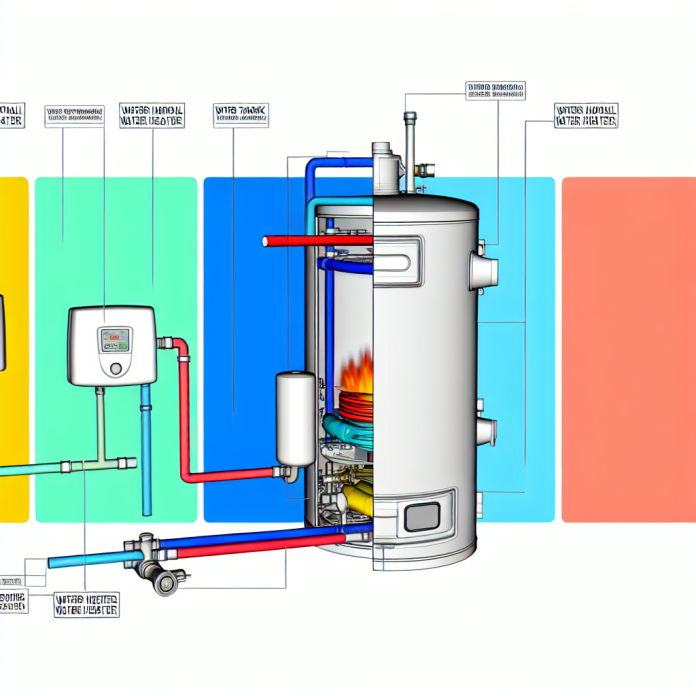Have you ever thought about how essential a water heater is for your everyday comfort? This remarkable appliance not only provides hot water on demand but also plays a pivotal role in your home’s hot water supply. Understanding how water heaters work is crucial for effective water heater maintenance and ensuring efficiency when you need it most. By learning about the different types of water heaters available and their components, homeowners can make informed decisions that enhance their home’s convenience. Join us as we explore the fascinating world of these heating units and uncover the secrets to keeping them in top condition for years to come.
When it comes to your household’s heating needs, having a reliable hot water system is indispensable. Water heaters, also known as hot water systems or heating units, come in various types and configurations, each designed to meet specific home requirements. Familiarizing yourself with these heating solutions can greatly improve your home’s efficiency and comfort. A thorough understanding of how these devices function, along with routine maintenance practices, ensures that your hot water supply remains uninterrupted and effective. Dive into this guide to discover the intricacies of heating units, their essential components, and practical care tips.
Understanding the Basics of How Water Heaters Work
Have you ever considered the fundamental workings of a water heater? At its core, a water heater operates based on a straightforward process that utilizes heating elements or burners to warm the water in a storage tank. When you switch on the hot water tap, cold water enters the tank through a dip tube, where it is subsequently heated by either electric coils or gas flames. This system ensures a consistent supply of hot water for bathing, cooking, and cleaning tasks, highlighting the convenience and necessity of a well-functioning water heater in any household.
A vital aspect of understanding how water heaters work involves knowing the different sources of energy they use. Most systems operate on either gas or electricity, but newer models may also harness solar energy. By being aware of how these energy sources affect your hot water supply, you can make informed decisions regarding maintenance, efficiency, and even cost-saving measures in your home. Furthermore, the temperature control system in modern water heaters allows users to set and maintain their desired water temperature, further enhancing the user experience.
Key Components of a Water Heater Explained
Understanding the key components of a water heater is crucial for both effective usage and maintenance. Each water heater consists of distinct parts—including the tank, thermostat, shut-off valve, and heating mechanism—that work together seamlessly. The tank serves as the storage unit, holding a specific capacity of heated water while the thermostat regulates the temperature, ensuring it meets user demand without overheating. Recognizing these components not only helps in troubleshooting common issues but also empowers you to carry out regular maintenance effectively.
For instance, the shut-off valve plays an integral role in controlling water flow, allowing home users to conduct safe repairs or inspections. Additionally, maintaining awareness of the pressure relief valve’s function is critical for safety; it prevents excessive pressure buildup within the tank, which can lead to dangerous situations. Familiarity with these internal components equips homeowners with the knowledge needed to extend the lifespan of their water heaters while ensuring optimal functionality.
The Process of Heating Water in Your Home
The process behind how a water heater heats water is both fascinating and essential knowledge for any homeowner. Initially, cold water is delivered to the tank via a dip tube, filling it to the required level. The heating mechanism—be it an electric element or a gas burner—then starts operating based on the thermostat settings. As the heating source engages, cold water at the bottom of the tank is heated, rising to the top where it awaits user demand. This efficient heating process guarantees that hot water is always at the ready for various daily tasks.
After heating, the temperature control system kicks in, allowing users to adjust the settings as needed. Models equipped with digital displays enhance user convenience by providing real-time information about water temperature and tank capacity. Moreover, understanding this process encourages homeowners to perform regular maintenance, including flushing the tank to remove sediment buildup, thus maintaining the efficiency and longevity of their water heaters.
Essential Water Heater Maintenance Tips
Regular maintenance of your water heater is crucial to ensure it operates efficiently and prolongs its lifespan. Homeowners are encouraged to assess their water heater regularly, inspecting for leaks, checking the temperature settings, and flushing the tank to clear any sediment that may have accumulated over time. Neglecting these tasks can lead to reduced efficiency and ultimately costly repairs or replacements.
Moreover, understanding the components that require attention during maintenance—such as the pressure relief valve and the anode rod—can help homeowners undertake preventive measures independently. Ensuring that these parts are functioning correctly can stave off potential breakdowns and enhance the overall performance of your hot water supply system. By integrating these simple maintenance practices into your routine, you can enjoy consistent hot water access while minimizing unexpected expenses.
Different Types of Water Heaters Explained
When it comes to selecting a water heater, it’s important to understand the various types available. The most common categories include tank water heaters, tankless models, and hybrid systems. Tank water heaters store a specified volume of heated water and are particularly suitable for households with consistent hot water demands. Conversely, tankless models heat water on demand, providing an endless supply but often at a higher upfront cost.
Hybrid water heaters, which combine heat pump technology with traditional heating methods, offer an energy-efficient option for environmentally-conscious consumers. Each type has its advantages and is suited to different household needs and preferences. Understanding these distinctions can help homeowners make more informed decisions when selecting or upgrading their water heaters.
Troubleshooting Common Water Heater Issues
Water heaters, like any home appliance, can encounter problems that may affect their performance. Some typical issues include insufficient hot water, unusual noises, and leaking tanks. In cases of insufficient hot water, homeowners should first check the thermostat settings and ensure that the heating element is functioning properly. If problems persist, it may be necessary to consult a professional.
Leaks can originate from several sources, including the pressure relief valve or connections, which can lead to water damage if not addressed quickly. By recognizing these common issues and understanding basic troubleshooting steps, homeowners can often resolve minor problems before they escalate, ultimately preserving their water heater’s functionality and efficiency.
The Importance of Safety Measures with Water Heaters
Safety should always be a priority when it comes to operating water heaters. Understanding the built-in safety features, such as pressure relief valves, is essential for minimizing risks associated with excessive pressure or temperature. Regular maintenance checks and understanding how to operate your unit safely can prevent accidents that may lead to harm or property damage.
Additionally, familiarizing yourself with the recommended temperature settings can also prevent scalding risks, especially in homes with children or elderly individuals. Implementing these safety measures not only enhances user experience but also contributes to the longevity of your water heater and greater overall household safety.
Understanding Energy Efficiency in Water Heaters
Energy efficiency is a significant factor to consider when selecting or operating a water heater. Water heaters with high energy efficiency ratings consume less energy, leading to lower utility bills and a reduced environmental impact. Homeowners should look for models that are Energy Star certified or explore options such as solar-powered water heaters, which can provide substantial savings over time.
Implementing energy-saving practices—like adjusting the temperature down a few degrees or insulating the heater and pipes—can further enhance energy efficiency. By understanding and applying these principles, homeowners can maximize their hot water supply while minimizing energy consumption, creating a more sustainable living environment.
Final Thoughts on Water Heater Knowledge
Having a comprehensive understanding of water heaters is crucial for any homeowner. This knowledge not only empowers you to select the right type of water heater that meets your family’s needs but also equips you to perform basic maintenance and troubleshooting. Regular assessments of your water heater can prevent minor issues from developing into costly repairs, ensuring that your hot water supply remains reliable and efficient.
Ultimately, investing time in learning about your water heater’s workings, safety measures, and maintenance practices enhances the longevity of this essential appliance and fosters a more enjoyable home environment. With this knowledge, you are better prepared to address potential issues and ensure that your hot water supply flows freely for all your household needs.
Frequently Asked Questions
How do water heaters work to supply hot water at home?
Water heaters operate by utilizing various internal components to heat incoming cold water. A dip tube delivers the cold water to the bottom of the tank where heating elements or a burner heat the water. Once heated, warm water rises to the top and is delivered through a heat-out pipe when you turn on a hot water tap.
What maintenance is required for my water heater?
Regular water heater maintenance involves checking the thermostat, inspecting for leaks, flushing the tank to remove sediment buildup, and testing the pressure relief valve. These tasks help improve efficiency and extend the lifespan of your water heater.
What are the different types of water heaters available?
The main types of water heaters include tankless, storage tank, heat pump, solar, and point-of-use. Each type has distinct features and heating mechanisms, with tank and tankless being the most common for residential use.
What are the key components of a water heater?
Key components of a water heater include the tank, thermostat, shut-off valve, heat-out pipe, heating mechanism (either electric elements or gas burner), and pressure relief valve. Understanding these components can help you maintain your water heater effectively.
Can I perform DIY maintenance on my water heater?
Yes, homeowners can perform some DIY maintenance on their water heaters, such as flushing the tank and checking for leaks. However, more complex repairs should be done by a licensed professional to ensure safety and compliance with local codes.
What are the safety measures for using a water heater?
Safety measures for water heaters include setting the temperature to a safe level (typically 120 degrees Fahrenheit), making sure the area around the heater is clear, and ensuring that safety valves work properly to prevent pressure buildup.
How long does it take to heat water in a water heater?
Typically, a gas water heater takes about 30 to 40 minutes to heat water, while an electric water heater can take over an hour. Heating time varies based on the tank’s size and the power source.
What is a common issue with water heaters and how to fix it?
A common issue with water heaters is leakage, often from the pressure relief valve. To fix this, inspect the valve for debris, ensure it is functioning correctly, and replace it if needed.
Are electric water heaters more efficient than gas ones?
Electric water heaters can be more energy-efficient compared to gas models since they require less maintenance and usually have lower operating costs in areas with cheap electricity.
How can I improve my water heater’s efficiency?
To improve your water heater’s efficiency, you can insulate the tank and pipes, set the temperature appropriately, and perform regular maintenance like flushing the tank to remove sediment.
| Component | Function | Notes |
|---|---|---|
| Water Tank | Stores cold water until heated for use | Capacity measured in gallons for user needs. |
Summary
A water heater is an essential appliance in every home that ensures a consistent supply of hot water. Understanding how a water heater operates can empower homeowners to effectively manage and maintain this appliance. It is crucial to know the key components like the water tank, thermostat, and safety measures, which play significant roles in its functionality. With proper care and regular maintenance, a water heater can provide years of dependable service, ensuring that you always have access to warm water for daily needs.
Source: https://homeyimprovements.com/how-does-a-water-heater-work/
### Transforming Your Home in Orange County: A Guide for Homeowners and Contractors
As a homeowner in Orange County, you know that the allure of living in cities like Laguna Beach and Newport Beach comes with the responsibility of maintaining and improving your property. With median home values soaring at around $1.18 million, investing in high-value renovations can significantly enhance your home’s appeal and functionality. For OC contractors, this represents a golden opportunity to tap into the affluent market eager for exceptional remodeling services.
#### Renovation Trends in OC: What Homeowners Want
OC homeowners are increasingly turning towards sophisticated renovation projects, including kitchen remodels, bathroom upgrades, and outdoor living enhancements. The demand for modern, sustainable designs that harmonize with California’s coastal climate is on the rise. This is fertile ground for contractors who can offer expertise in complying with California’s stringent building codes and provide energy-efficient solutions that resonate with environmentally conscious buyers.
#### Navigating Permits and Regulations in Orange County
When planning a remodeling project in cities like Irvine and Costa Mesa, homeowners and contractors must be adept at navigating local regulations. Understanding the arrangement of zoning permits and building codes is critical. OC contractors should familiarize themselves with the specific requirements for each city, as this knowledge can streamline project timelines and avoid costly delays. Additionally, being aware of the climate considerations will help contractors recommend materials and methods suited for Orange County’s unique environment.
#### Business Opportunities for Contractors in OC
As the demand for home renovations grows amidst affluent demographics, contractors have a chance to establish themselves as leaders in the OC market. Networking with local suppliers and collaborating with real estate agents can cast a wider net, attracting homeowners ready to invest $50,000 to $500,000 or more in their properties. Moreover, engaging in community events and showcasing successful projects in popular OC neighborhoods can enhance visibility and credibility.
#### Conclusion: Engage with the Orange County Remodeling Community
As Orange County homeowners embark on their remodeling journeys, the role of professional contractors becomes increasingly vital. By staying informed and connected within the local market, contractors can not only meet but exceed the expectations of the discerning OC clientele. For homeowners considering renovation, reaching out to local contractors can provide critical insights while fostering a supportive community dedicated to enhancing the beauty of living in OC. Let’s connect and transform homes together!


